Praying for a real estate crash
The have-nots of housing are watching, mad as hell, as homeowners glory in their paper fortunes. And they’re starting to lash out.
(Ben Nelms/Reuters)
Share
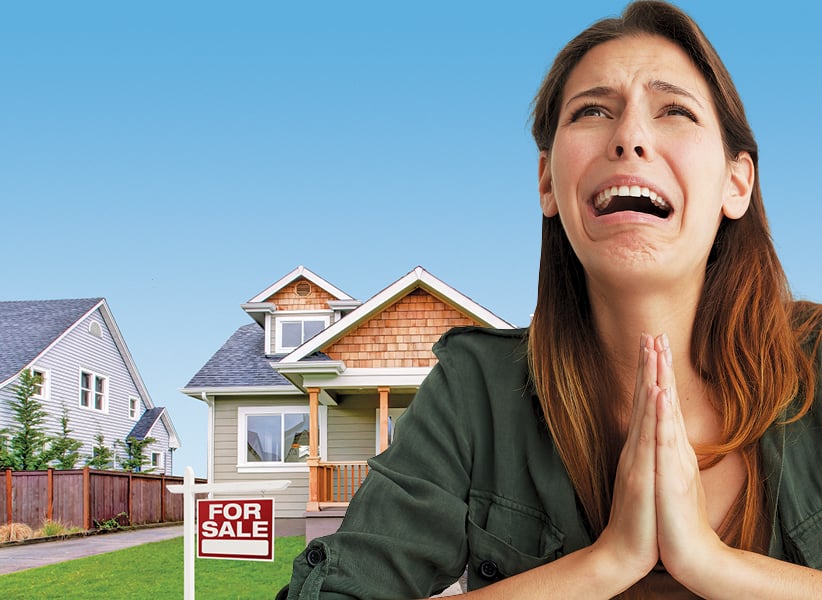
A year after getting married, Alex Taylor and Rachel Tuttle decided it was time to buy a home and start a family. The two Vancouver residents were in their late 30s, and each had stable, full-time jobs—Taylor served as an urban planner while Tuttle worked for a credit union. They were debt-free, and after years of hard work, frugal living, and the sale of a previous home Tuttle had owned in England, they had a down payment ready. The couple figured they could buy a fixer-upper in Vancouver’s historically low-income Downtown Eastside neighbourhood. But soon after starting the hunt in 2015, their hopes were dashed. Detached homes were averaging $1.2 million, and even though Taylor and Tuttle qualified for a mortgage, they would have faced steep monthly payments of $4,000. They adjusted their expectations and set their sights on a townhouse on the outskirts of the city. Still, the cost was too high. “It felt very risky to put that much of your savings into one investment,” says Tuttle.
That risk hasn’t stopped plenty of their peers from diving into the white-hot real estate market. Some got in before the bubble; others took the plunge more recently in a fit of panic as it seemed prices would never stop escalating. Taylor and Tuttle sensed an opportunity last year, when the province put in a place measures, including a foreign buyer tax, to temper runaway house prices. Sales slumped, but prices are picking up again. “It’s discouraging,” says Tuttle. “We look at people who bought two years ago and they’ve now made 30 per cent on their purchase. You definitely feel like you’ve been left behind.” Taylor is tired of talking about the issue. “I know it’s mean to say and I know it would hurt those of our friends who completely over-extended themselves,” he says, “but honestly, we’re praying for a crash.”
He’s not the only one. As prices in Vancouver and Toronto have skyrocketed and affordability has eroded, scores of Canadians fear getting permanently shut out of the country’s two largest regions. Paying for all of the costs associated with a detached home in the Vancouver area requires 121 per cent of median household income; for a condo, it’s 46 per cent of income, making it Canada’s least affordable city, according to economists at the Royal Bank of Canada. Toronto isn’t far behind. Aggregate housing costs are 64.6 per cent of income, the worst level since 1990, when interest rates spiked.
Soaring prices have for months stoked resentment between the haves and have-nots of housing, as young, educated Canadians who in the past could be assured a shot at purchasing a home and achieving financial stability feel the opportunity slipping away. With every price spike, the antipathy has deepened, but the hostility has come into sharper relief after Ontario followed B.C.’s example this spring by introducing its own market-cooling measures. In May, sales dropped 20 per cent compared to the year before in the Greater Toronto Area while active listings surged 42.9 per cent from a record low. Those are the kinds of numbers that cause indebted homeowners to sweat, but serve as a balm for those on the sidelines in Toronto: like Taylor in B.C., many now openly cheer for the market to collapse.
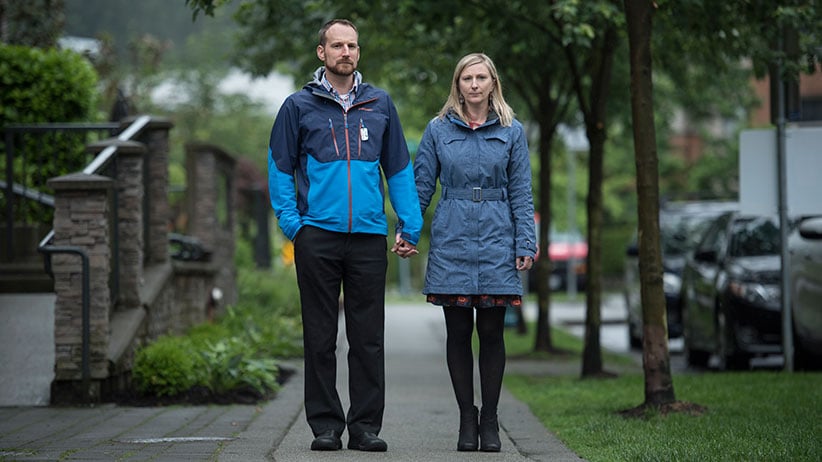
Nowhere is the antagonism more evident than on social media. Facebook and Twitter are home to daily (even hourly) outrages, of course, but a recent Toronto Life article touched off a firestorm and revealed deep frustrations about the state of the housing market. The author, Catherine Jheon, recounted the “nightmare” renovation she and her husband undertook, sinking hundreds of thousands dollars into a “crack house” purchased almost on impulse, with seemingly little to no concern for the low-income tenants who were evicted in the process. Many saw the couple as the worst kind of gentrifiers: privileged, callous and clueless. Jheon and her husband made numerous bad decisions during the renovation, but were still able to continue borrowing money (including from a wealthy relative) and ultimately rewarded for their fecklessness with a palatial detached house in an up-and-coming neighbourhood. On social media, readers expressed intense loathing (“I hate these people so much,”) threats of physical violence (“Dear god, I want to punch them in the face,”) and a longing for karmic justice (“I’ve never wanted the entire real estate market to completely collapse until now”).
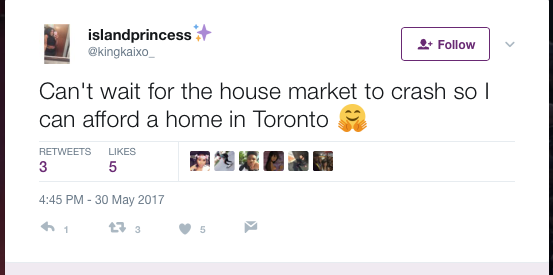
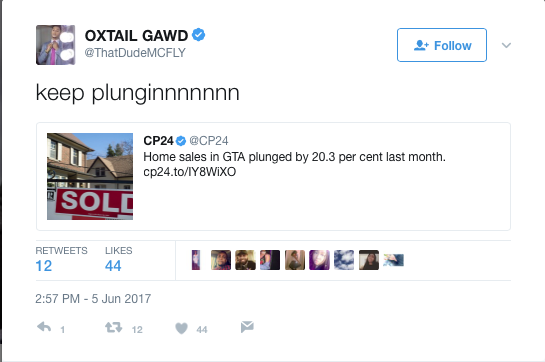
It’s not all jealously, envy and social media griping. Missing out on home-ownership often means missing out on housing stability and security. Rental markets in Toronto and Vancouver are extremely tight, units suitable for raising families in are highly coveted, and being subjected to the whims of a landlord can make for a precarious existence. Hundreds of tenants in Toronto’s Parkdale neighbourhood, for example, have been withholding payments for more than two months to protest steep rent hikes in apartments meant to be rent-controlled. Many believe the goal is to squeeze them out so the building’s property management firm can re-list the units at market rates, well above what the current tenants are paying. Last month, the firm’s CEO nearly ran over a tenant advocate with his truck.
Everybody should be guaranteed shelter, but owning property in the city of our choosing is not a right. Nevertheless, Canada is a nation of homeowners—nearly 70 per cent of households own their dwelling (in the Greater Toronto and Hamilton Area, around 120,000 owners possess more than one residential property.) Everything in society pushes us toward home-ownership, from popular culture to social pressure, not to mention government policy. The Canada Mortgage and Housing Corporation provides mortgage insurance to buyers, transferring the risk from private lenders to taxpayers, helping to ensure the availability of low-cost capital to purchase homes. First-time buyers can withdraw up to $25,000 each from an RRSP account tax-free for a down payment, score tax rebates, and forgo capital gains tax on the sale of a primary residence. In 1983, a researcher for the University of Toronto looked at federal direct spending and tax expenditures related to housing, which totalled more than $6-billion at the time. Roughly 95 per cent of those dollars assisted homeowners; private renters accounted for the remaining five per cent. When urban and real estate economist Frank Clayton revisited the topic nearly three decades later, he found the ratio had barely budged.
While housing policy was crafted to ensure Canadians had equal opportunity to purchase a home, runaway prices are driving a wedge between those who can afford to and those who can’t. “Housing has helped the rich get richer, as the poor get poorer,” said CMHC president Evan Siddall in a speech this month. As prices escalate, homeowners build up equity that can serve as a retirement fund. A Manulife survey found nearly 20 per cent of Canadians expect to use home equity to help finance retirement; another survey from TD Bank Group, meanwhile, found 70 per cent of millennials expect to be working well past age 60. Tuttle and her husband fear that not owning a home means they’re falling behind financially. “The primary purpose of a house will be to have somewhere to live of course, but it would be a pretty solid and safe investment as well,” she says. “There’s not really a good alternative for people like us to put our money into other than real estate.”
House-rich Canadians are taking full advantage of price gains, tapping into home-equity lines of credit and (to non-owners, at least) flaunting their conspicuous consumption. The Financial Consumer Agency of Canada found the number of households with a HELOC and a mortgage against their home has increased nearly 40 per cent since 2011, prompting commissioner Lucie Tedesco to caution this month the trend “may lead Canadians to use their homes as ATMs.” Last year, Canadians withdrew $12.8 billion in home equity to fund renovations, according to Scotiabank Economics, and another $3.6 billion for “other” purposes. HELOCs can be risky, to be sure, but it’s a source of financing non-homeowners simply cannot access.
“A lot of people have these totally unsustainable lifestyles they’re only able to pull off because, by doing nothing but sit on their ass, their net worth goes up by a few grand every month,” says Toronto resident Phillip Mendonça-Vieira. “I don’t think there’s anyone who doesn’t own property who’s not secretly, like, ‘F–k you, guys. This is unsustainable.’” Mendonça-Vieira has taken a keen interest in housing. He co-founded a group called BetterTO to organize discussions on issues facing the city—the first, held in March, focused on housing. The 30-year-old has shared a rental for the last two years; the owners of the house took advantage of the city’s exorbitant prices and cashed out a few months ago. Mendonça-Vieira faces the prospect of moving again, at a time when he and his partner would like to settle down in preparation for having kids in the near future. Had Mendonça-Vieira, who runs a small startup, and his partner, a lawyer, been in this situation a year or two ago, they might have been able to purchase a home. But then the average home price soared more than 30 per cent since the start of 2016 alone. “Frankly, it’s kind of inconceivable to own a house,” he says.
A friend, however, recently suggested buying a property with Mendonça-Vieira and his partner, and the trio has started sending each other property listings. He’s not getting his hopes up. “If we don’t find something in the next six months, I don’t think we ever will,” he says. Renting would be an acceptable—provided they could find a unit to accommodate a family, and they had stability of tenure (as a renter in Toronto, he’s had to move about once every 18 months.) “I’d like to know I can have a place to hang my hat,” he says. “The way policy has been set up in most of Canada, the only way to achieve that is to own property.”
What makes matters more frustrating is homeowner opposition to rental and multi-unit developments. “We have a housing shortage, and a large group of people who don’t want more housing—often people who already have secure housing, and who get richer if there is a shortage,” says Daniel Oleksiuk, a member of Abundant Housing Vancouver, an organization that advocates for changing zoning practices to build more multi-unit housing. “There’s a class of landowners that passively grow wealthy, and another class that’s struggling to pay rent,” he says. “That’s not the Canada I learned about growing up.”
To take one example, a developer submitted a proposal to turn a derelict church building in the Douglas Park area of Vancouver into multi-unit development. Residents of the area—made up of multi-million dollar, single-family homes—mobilized under the umbrella of the Douglas Park Neighbours Association (DPNA). Lawn signs bearing messages such as “Ozone Yes. Rezone No” sprung up, and residents voiced their complaints to the city. By most measures, the project was modest: the developer intended to build just 10 units. Last year, the developer submitted a new proposal for only six units, plus reduced space for bicycle parking. “It’s death by a thousand cuts,” Oleksiuk says.
DPNA member Dale Leibel, who purchased his Douglas Park home in 1999, says the organization suggested a plan to the developer that would maintain the same level of density, but is more in-tune with the single-family feel of the neighbourhood (the developer was unavailable for comment). Still, the neighbourhood fears the proposal could set a precedent. “If all of a sudden there becomes multi-family applications put forward, it will change the feeling of the neighbourhood,” Leibel says. “When I walk out my door in Douglas Park, it’s alive, it’s breathing. It’s the ideal neighbourhood everybody wants, and I don’t think we want to take changes to a neighbourhood that’s working lightly.”
The DPNA opposes the current six-unit plan, too. Proposed lockout suites raise “the possibility of Airbnb rentals and higher density,” warns to the group’s website. The association lists a litany of other complaints, including noise and dust during construction and threats to property values. Meanwhile, the DPNA is offering “TAKE A STAND” t-shirts and lawn signs through its website.
At a time of nosebleed prices, debt-fuelled spending and opposition to density, who wouldn’t want the market to take a hit, if only out of spite? The reality, though, is that house-price corrections don’t take place in isolation—and there are far-reaching consequences.
One way for price growth to halt or even fall is for interest rates to rise. But affordability wouldn’t necessarily improve since mortgage carrying costs would also rise. An even less attractive remedy is a recession. A severe economic shock could be devastating for heavily indebted households, curb consumer spending and business investment, and send house prices cratering.
But recessions, of course, are often accompanied by a spike in unemployment. Anyone waiting for a crash could find themselves out of a job when and if it happens—hardly an ideal situation in which to secure a mortgage and buy a house. “You would have to be in a position to do it when the economy is going through its toughest time,” says Robert Kavcic, a senior economist with the Bank of Montreal. The ideal opportunist would need stable employment, a down payment squirrelled away and impeccable market timing. And even a 30 per cent correction in Toronto house prices would still leave homeownership a remote prospect for many. “Homes in Toronto would be more affordable, but they would still be reasonably expensive by Canadian standards,” says Jean-François Perrault, chief economist at Scotiabank.
As it stands, the fundamentals underpinning housing markets in Vancouver and Toronto remain strong—local economies are growing, immigration is robust and interest rates are low. Vancouver’s market dipped after the implementation of the foreign buyer tax last year, but prices are rising again. By one measure, it took eight months for the city’s market to overtake its previous high. Toronto, where the provincial government put in place a similar measure in April, looks to be on the same path. “We’re more likely to see something like Vancouver rather than a prolonged fall in prices that would somehow make Toronto housing much more affordable,” Perrault says.
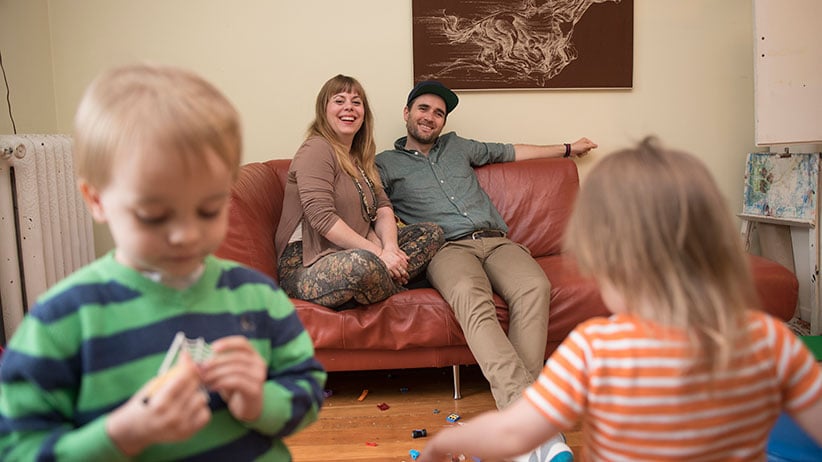
It’s a bitter pill for many. After 20 years of renting in Vancouver, actress and playwright Emelia Symington Fedy has come to the realization that she’ll never have secure housing—let alone own a home—in the city she loves. Fed up with her city’s real estate market, she’s packing up her family and moving to Halifax. “It’s heart-breaking,” she says, “but living here is not good for my mental health.” She had been renting in Vancouver’s Downtown Eastside for ten years, during which time she’d built a successful local theatre company, a strong community of friends, and had had two children with her husband who also works in the arts. She had no intention of moving, until pressure from the housing frenzy began weighing on her. Fearful that her landlord would “renovict” her at any moment, her “momma bear instincts” kicked in and she began craving the security of home-ownership. But in Vancouver, on two artists’ salaries, that wasn’t an option. “The way rents have gone up, if we were kicked out of our [three-bedroom] home, we would have to live in a one-bedroom basement,” she says.
Instead, she and her family will live in a four-bedroom heritage home in the north end of Halifax where their monthly mortgage payments are roughly half the cost of renting a two-bedroom apartment in Vancouver. “I walked into that house and I started to bawl,” she says. “I can see us there. I can see the kids in the tiny rooms. There was something about this little nest that no one can evict me from—that feeling brought me to tears.”
MORE ABOUT REAL ESTATE: